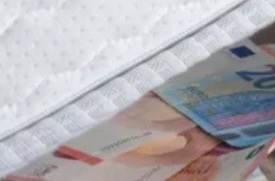Storing or transporting cash may seem trivial, but these practices are governed by specific rules in France. To avoid any problems, it is essential to fully understand the current legislation and comply with certain obligations. Here's everything you need to know.
Keeping cash at home: what you need to know
In France, there is no legal limit on the amount of cash you can keep at home. The Banque de France confirms this freedom, while reminding you that you may be required to provide proof of the origin of your funds in the event of an inspection. This measure aims to combat money laundering and the financing of terrorism.
To prevent any misunderstandings, it is advisable to keep supporting documents attesting to the origin of your savings, such as bank statements, proof of withdrawals, or documents related to a sale.
If you choose to store large sums of money at home, adopt security measures such as installing a safe. Additionally, avoid disclosing your cash to third parties to limit the risk of theft.
Carrying Cash: Rules to Follow
When traveling, specific requirements govern the transport of large sums of cash. If you are traveling to or from a country outside the European Union, any amount exceeding €10,000 must be declared to customs. This requirement applies not only to cash, but also to valuables such as gold or prepaid cards.
The declaration is completed online via a platform accessible on the French customs website. An oversight or error in this procedure can result in significant financial penalties. These rules aim to ensure the transparency of financial flows and combat illicit activities. If you regularly transport significant sums of money, take the time to inform yourself to avoid unnecessary complications.
Prove the origin of your funds in case of an inspection
Although keeping or transporting cash is perfectly legal, you may be subject to an inspection. Authorities, such as law enforcement or banks, may require proof of the source of your funds. This evidence may include sales contracts, bank statements, or inheritance documents.
Failing to provide supporting documents could result in accusations of tax fraud or money laundering. To avoid such situations, prepare and store these documents in a secure location. Good organization can make all the difference in the event of an unannounced check.
Adopt best practices to avoid penalties
To remain compliant with French law, it is essential to declare any amount exceeding €10,000 when traveling outside the European Union. At home, carry supporting documents proving the source of your savings. These precautions aim to prevent illicit activities while ensuring transparency in the use of funds.
Finally, investing in a security system such as a safe is a wise solution to protect your cash. If you have any doubts about the rules or best practices, don't hesitate to consult a financial advisor or contact the relevant authorities. Adopting a proactive stance will save you a lot of trouble while protecting your savings.
